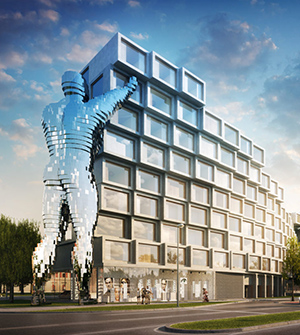
<div>Space for an additional 400,000 residents can fit into Prague, said the chief planner.</div>
 |
According to Boháč, a density above 100 people per hectare allows for the sustainability of restaurants, eliminates the need to subsidize public transportation, and significantly lowers the required level of public investment in infrastructure compared to low population density. At the same time, he pointed out that this is not a crowded city; for example, Vinohrady and Dejvice in Prague have around 200 to 250 residents per hectare and are among the most attractive and sought-after residential neighborhoods.
The director added that the Czech capital is sparsely populated in international comparison; for instance, he mentioned that in Barcelona, on average, 600 people live on one hectare. According to data from the IPR, there is room to build, and if brownfields and smaller building plots were utilized, it wouldn't be a problem to accommodate the projected population increase of about 300,000 people by 2050, based on a recent analysis by the institute, given the current size of the city. According to the Czech Statistical Office (ČSÚ), in the first quarter of this year, Prague lost 3,445 residents, bringing the population to 1.39 million people.
However, according to Boháč, the problem is that even though there is room for construction, the over-regulated Czech environment practically prevents it. This is not about regulations introduced at the behest of European legislation, but rather a purely Czech obsession with various norms and regulations, he stated. "I think this is something we need to change," he remarked. "Prague needs to build about 10,000 apartments a year, and we are at about half of that," he added.
According to Boháč, there is no simple large solution that would resolve the housing crisis in the metropolis. For example, the frequently mentioned ban on short-term rentals in apartments on platforms like Airbnb will not solve anything fundamental, as it concerns about 8,700 apartments, mostly in Prague 1 and 2, he stated. According to Boháč, a thoughtful combination of various partial measures is necessary, focusing primarily on unblocking regulations in construction. Even though the construction of rental apartments by the public sector is a welcome complement, the private sector will always remain crucial due to the volume of apartments needed, he said.
The English translation is powered by AI tool. Switch to Czech to view the original text source.
0 comments
add comment











